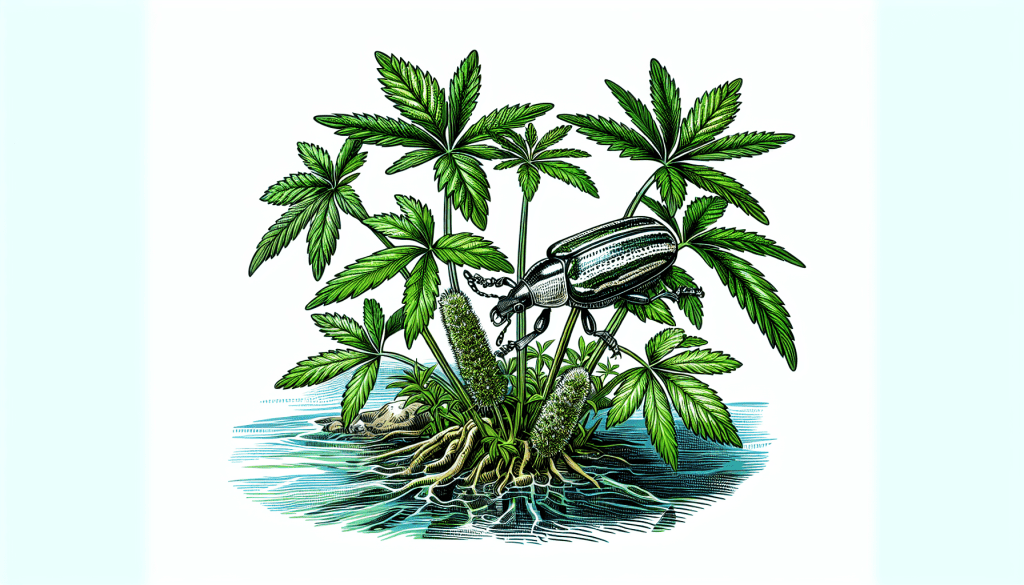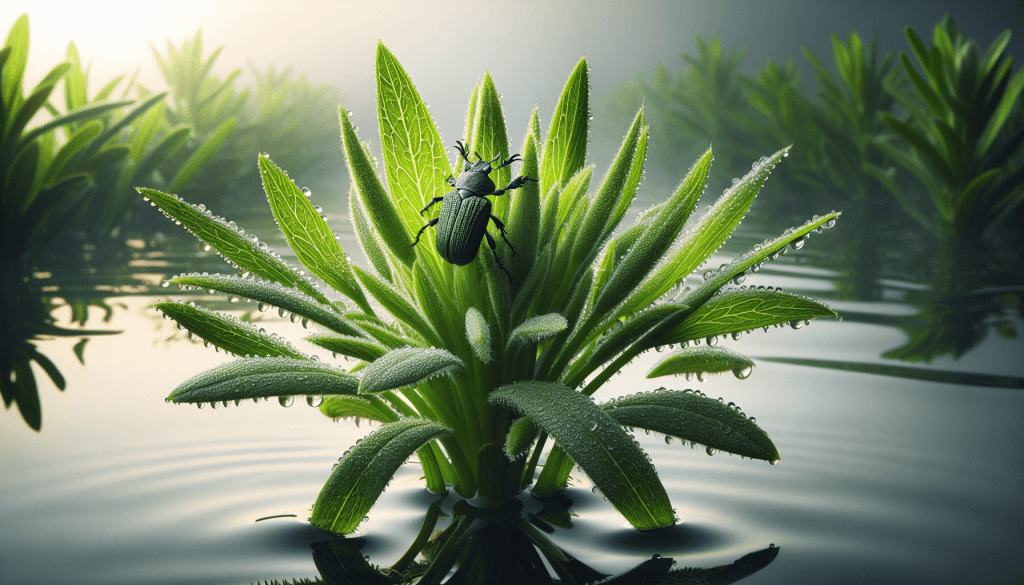You’re about to embark on a fascinating journey into the world of biological controls and their essential role in taming one of nature’s most persistent invaders: alligator weed. In “The Role Of Biological Controls In Managing Alligator Weed,” you’ll explore how scientists and ecologists employ natural solutions to combat this aggressive aquatic plant. You’ll discover the innovative strategies being employed, from predatory insects to specialized fungi, that help restore balance to our ecosystems without the need for harmful chemicals. Dive in and learn how we can protect our waterways and native species through the power of nature itself. Have you ever wondered about the complexity of managing invasive plants, like alligator weed, without causing harm to the environment? Alligator weed, an aquatic invasive species, poses significant challenges to ecosystems, agriculture, and water navigation systems. But fear not! There’s a solution that balances effectiveness and environmental protection: biological controls.
What is Alligator Weed?
Alligator weed (Alternanthera philoxeroides) is a troublesome perennial plant originally from South America. It has made its way to several regions around the world, including the United States, where it thrives in wetland areas, ditches, and even agricultural fields.
Why is Alligator Weed Problematic?
Alligator weed grows rapidly, forming dense mats that can choke waterways, displace native vegetation, and disrupt aquatic ecosystems. Its aggressive growth can lead to significant economic losses in agriculture and reduce the efficiency of water management facilities.
Traditional Control Methods
Controlling alligator weed traditionally involves mechanical and chemical methods. Let’s break down these common practices:
| Method | Description | Limitations |
|---|---|---|
| Mechanical | Physical removal of the plant through cutting, dredging, or harvesting. | Labor-intensive, can miss root fragments leading to regrowth, potential habitat damage. |
| Chemical | Application of herbicides to kill the plant. | Can be harmful to non-target species, water quality issues, and sometimes ineffective. |
While these methods can be effective in the short term, they often come with significant environmental risks and aren’t always sustainable.

Biological Control: A Natural Solution
Biological control, or biocontrol, employs natural enemies, such as insects, fungi, and pathogens, to manage invasive species. The idea is to restore ecological balance by introducing organisms that keep the invasive plant populations in check.
How Do Biological Controls Work?
Introducing a natural predator to the invasive species can reduce its population without the collateral damage associated with chemical controls. These biological agents target only the invasive plant species, minimizing harm to non-target organisms.
Successful Biological Control Agents for Alligator Weed
Different biological agents have shown success in controlling alligator weed. Let’s look at a few key players:
Alligator Weed Flea Beetle (Agasicles hygrophila)
The alligator weed flea beetle is one of the most successful biocontrol agents, specifically targeting alligator weed without affecting other plants. It feeds on the leaves and stems, weakening the plant and reducing its ability to photosynthesize.
Alligator Weed Thrips (Amynothrips andersoni)
Thrips are small insects known for their ability to damage various plants. The alligator weed thrips feed on the leaves, causing significant stress to the plant, which can lead to a reduction in biomass and spread.
Advantages of Biological Controls
Employing biological controls for managing alligator weed has multiple benefits:
| Advantage | Explanation |
|---|---|
| Environmentally Friendly | Targets specific species, reducing the risk to non-target organisms. |
| Long-term Solution | Once established, biocontrol agents can manage the invasive species sustainably. |
| Cost-effective | Reduces the need for continuous mechanical or chemical interventions. |

Implementing Biological Controls
Introducing biological controls isn’t just about releasing the agents and watching them work. It involves a well-planned strategy to ensure success and minimize potential risks.
Steps in Implementing Biological Controls
- Identification and Preparation: Identify suitable biological agents that specifically target alligator weed. Ensure they pose no significant risk to non-target species.
- Pilot Testing: Before large-scale implementation, conduct small-scale trials to monitor effectiveness and any unforeseen impacts.
- Release and Monitoring: Release the agents into the affected areas and monitor their population and impact on alligator weed.
- Assessment and Adaptation: Continuously assess the effectiveness of the biocontrol agents and adapt strategies accordingly.
Case Studies and Success Stories
Example 1: The Australian Experience
Australia has faced significant challenges with alligator weed, leading to a concerted effort to employ biological controls. The introduction of the alligator weed flea beetle and thrips in the 1970s resulted in substantial control of alligator weed infestations, leading to the recovery of native vegetation and improved water quality.
Example 2: United States Initiatives
In the United States, agencies have successfully utilized biocontrol agents to manage alligator weed in several states. These efforts have demonstrated the effectiveness of using natural predators to reduce the plant’s spread and impact without resorting to chemical herbicides.

Challenges and Considerations
While biological controls offer many benefits, they also come with challenges and considerations. Let’s explore a few:
Ensuring Target Specificity
Ensuring that the biological agents specifically target alligator weed without affecting other plants is crucial. Thorough testing and research are necessary before the release of biocontrol agents.
Ecological Balance
Introducing a new species into an ecosystem can sometimes have unforeseen consequences. It’s essential to monitor the ecosystem’s balance and ensure that the biocontrol agents don’t become invasive themselves.
Public and Regulatory Support
Gaining support from the public and regulators is crucial for successful implementation. Educating stakeholders on the benefits and safety of biological controls can build trust and cooperation.
Long-term Commitment
Managing invasive species isn’t a one-time effort. It requires ongoing monitoring, assessment, and adaptation to ensure long-term success.

Future Outlook for Biological Controls
The future of biological controls in managing invasive species like alligator weed looks promising. Advancements in research, technology, and ecological understanding are paving the way for more effective and sustainable solutions.
Research and Innovation
Ongoing research is crucial to discovering new biological agents and improving existing ones. Innovations in genetic tools and ecological modeling can enhance the specificity and effectiveness of biocontrol agents.
Integrated Pest Management
Combining biological controls with other management practices, such as mechanical and chemical controls, can offer a more comprehensive and effective approach. Integrated Pest Management (IPM) involves using multiple strategies in a coordinated manner to manage invasive species sustainably.

Conclusion
Managing alligator weed is a complex challenge, but biological controls offer a promising and environmentally friendly solution. By leveraging natural predators and carefully implementing them, you can protect ecosystems, reduce economic losses, and promote sustainable management practices. Embracing biological controls isn’t just about tackling the problem at hand; it’s about fostering a harmonious balance between human activities and nature.
So next time you encounter a dense mat of alligator weed, remember that nature itself holds the key to its management. Through thoughtful and strategic use of biological controls, we can create a healthier and more balanced environment for future generations.
